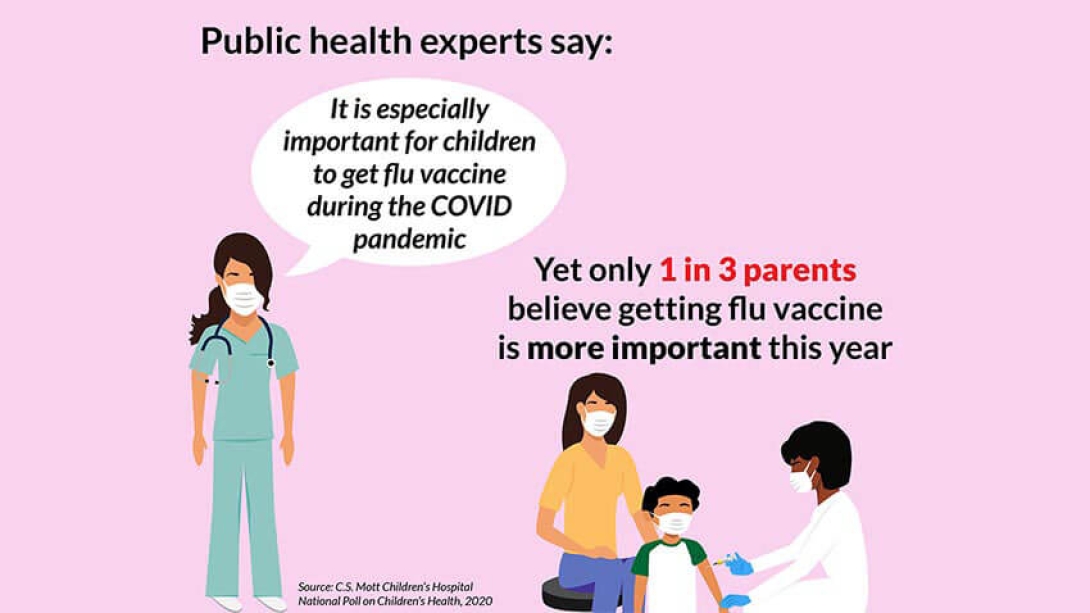National Poll finds COVID-19 may not influence parents’ beliefs about the flu vaccine, with just 1/3 believing it’s more important for children to get vaccinated in 2020.
5:00 AM
Author |

The pandemic doesn't seem to be changing parents' minds about the importance of the flu vaccine.
It could be a double whammy flu season this year as the nation already faces a viral deadly disease with nearly twin symptoms. And while public health experts have emphasized the importance of people of all ages receiving seasonal flu vaccines during the COVID-19 pandemic, many parents may not be getting that message.
Just a third of parents believe that having their child get the flu vaccine is more important this year, a national poll suggests.
And as schools reopen for the first time since the novel coronavirus outbreak, one in three parents don't plan to vaccinate children against the flu, according to the C.S. Mott Children's Hospital National Poll on Children's Health at Michigan Medicine.
LISTEN UP: Add the new Michigan Medicine News Break to your Alexa-enabled device, or subscribe to our daily updates on iTunes, Google Play and Stitcher.
"We may see peaks of flu and COVID-19 at the same time, which could overwhelm the health care system, strain testing capacity and potentially reduce our ability to catch and treat both respiratory illnesses effectively," says Mott Poll co-director Sarah Clark, M.P.H.
"Our report finds that even during the pandemic, some parents don't see the flu vaccine as more urgent or necessary. This heightens concerns about how the onset of flu season may compound challenges in managing COVID-19."
Influenza has led to between 9 to 45 million illnesses, 140,000 to 810,000 hospitalizations and 12,000 to 61,000 deaths a year since 2010, according to estimates by the Centers for Disease Control.
Children younger than five, and especially those younger than two, are at high risk of developing serious flu-related complications. The CDC reported 188 pediatric flu deaths during the 2019-2020 flu season.

Reasons parents say they skip the vaccine
The nationally representative Mott Poll report includes 1,992 responses from parents of children age 2-18 years who were surveyed in August.
Families who were least likely to get children vaccinated against the flu were those who didn't do so last year – less than a third of those parents say their child will probably get a flu vaccine this year.
In contrast, among parents who said their child got flu vaccine last year, nearly all (96%) intend to have their child get flu vaccine this year.
"A key challenge for public health officials is how to reach parents who do not routinely seek seasonal flu vaccination for their child," Clark says. "When getting a yearly flu vaccine is not a pattern, parents need to be prompted to think about why it's essential for their child to get vaccinated."
And according to the Mott Poll report, families whose provider strongly recommends vaccination are more likely to get children vaccinated against the flu.
Still, less than half of parents say their child's regular health care provider strongly recommends that their child get the flu vaccine this year.
SEE ALSO: 6 Reasons Your Child Needs a Flu Shot Now
Clark notes that this may be due to the impact of COVID on the health care delivery system, as many child health providers have limited the number of patients seen for in-person visits, with increased use of telehealth visits. This may reduce opportunities for providers to give a strong recommendation about flu vaccination for children and to answer parents' questions about flu vaccine safety and effectiveness.
Given the decrease in in-person visits, child health providers should look for other strategies, such as reminder postcards or website banners to emphasize the importance of children getting the flu vaccine during this pandemic year, Clark says.
Among the 32% of parents who say their child is unlikely to get a flu vaccine this year, the most common reasons include concerns about side effects or beliefs that it isn't necessary or effective.
But experts say these notions are often based in misconceptions about the flu vaccine, which still offers the best protection against both contracting the virus and also developing severe influenza-related illness.
"There is a lot of misinformation about the flu vaccine, but it is the best defense for children against serious health consequences of influenza and the risk of spreading it to others," Clark says.
MORE FROM MICHIGAN: Sign up for our weekly newsletter
Fourteen percent of parents said they will not seek the flu vaccine because they are keeping children away from health care sites due to the risk of COVID exposure, according to the Mott Poll.
"Most child health providers have made changes to their office environment to keep children safe during office visits and vaccinations," says Clark. "Parents who are concerned about COVID exposure should contact their child's provider to learn about what types of precautions have been put in place."
Michigan Medicine has taken several steps to reopen safely. Mott pediatric clinics are also implementing proactive measures to separate children with symptoms of illness and those who appear well. As clinics expand services, doctors aim to prioritize well-visits for children two-years-old or younger, any child due or overdue for preventive care or immunizations and families with urgent concerns about their child's growth, development or behavior.
We may see peaks of flu and COVID-19 at the same time, which could overwhelm the health care system, strain testing capacity and potentially reduce our ability to catch and treat both respiratory illnesses effectively.Sarah Clark, M.P.H.
Nine percent of parents also say their child is afraid of needles or does not want to the get flu vaccine, which prevents them from scheduling an immunization. Mott teams recommend several strategies, including using books and comfort positions to help alleviate fears and anxiety among young children.
Parental intention regarding flu vaccine this year is also slightly lower for parents of teens compared to younger children (73% for children ages 2-4, 70% for ages 5-12 and 65% for ages 13-18.)
Teens sometimes receive the flu vaccine outside of their usual health care provider office. Some of those options may be limited by COVID, Clark notes, including schools, health fairs and walk-in clinics at a local health department. However, many retail pharmacies are also expanding their flu vaccine services to children during the pandemic.
Flu vaccine in the time of COVID
Reports from the state health department and CDC indicate that during the pandemic, the overall rates of childhood vaccinations dropped significantly in states like Michigan. Children appeared to be falling behind on vaccinations for diseases like measles and pertussis (whooping cough), magnifying public health concerns about kids potentially catching vaccine-preventable diseases.
Experts say the flu vaccine will help limit the stress on health care systems during the pandemic by reducing the number of influenza-related hospitalizations and doctor visits, and decreasing the need for diagnostic tests to distinguish flu from COVID, which has similar symptoms.
"Children should get the flu vaccine not only to protect themselves but to prevent the spread of influenza to family members and those who are at higher risk of serious complications," Clark says.

Explore a variety of health care news & stories by visiting the Health Lab home page for more articles.

Department of Communication at Michigan Medicine
Want top health & research news weekly? Sign up for Health Lab’s newsletters today!





